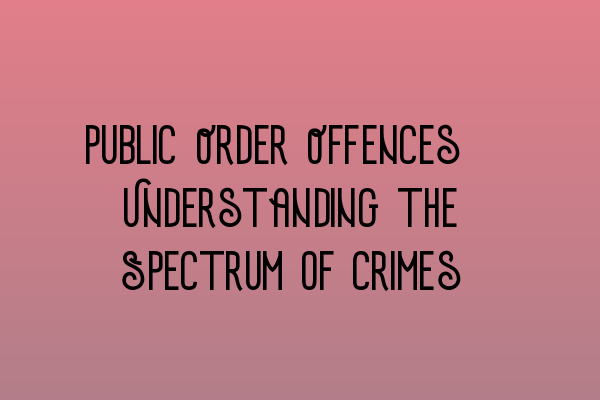Public Order Offences: Understanding the Spectrum of Crimes
Public order offences are a category of crimes that involve acts that disrupt or endanger public order or create a disturbance affecting the peace and tranquility of society. Understanding the spectrum of public order offences is essential for individuals working in the field of criminal law and practice.
Types of Public Order Offences
Public order offences can range from minor infractions to more serious crimes. It is important to have a clear understanding of these offences to appropriately advise clients and navigate the legal system. Let’s explore some of the common types of public order offences:
1. Disorderly Conduct
Disorderly conduct involves engaging in behavior that causes a disruption in public places, such as loud and aggressive behavior, verbal abuse, or fighting. It can also include actions that cause fear, alarm, or distress to others. Understanding the elements of disorderly conduct is crucial in defending clients or prosecuting individuals accused of such offences.
To learn more about disorderly conduct and its legal implications, check out this SQE 1 Practice Mocks FLK1 FLK2 article.
2. Public Intoxication
Public intoxication refers to being under the influence of alcohol or drugs in a public place. This offence is often associated with disorderly conduct and can result in penalties or mandatory rehabilitation programs. Understanding the legal aspects of public intoxication will help in advising clients who may be facing charges related to this offence.
3. Offensive Language or Behavior
Using offensive language or engaging in offensive behavior can result in public order offences. This can include racial or religious slurs, hate speech, or actions that incite violence or hatred. Awareness of the legal framework surrounding offensive language or behavior is vital in protecting individuals’ rights and ensuring justice is served.
If you want to test your knowledge about public order offences and prepare for the SQE 1 exam, we recommend taking a look at these SQE 1 Practice Exam Questions.
4. Riots and Unlawful Assembly
Riots and unlawful assembly involve a group of individuals engaging in violent, destructive, or disorderly conduct. These offences carry severe penalties and require a comprehensive understanding of criminal law to effectively advocate for clients involved in such cases.
To further enhance your understanding of criminal law and practice, consider enrolling in SQE 2 Preparation Courses.
Consequences and Penalties
Public order offences can lead to a range of consequences and penalties, depending on the severity of the offence and the specific circumstances of the case. Penalties may include fines, community service, probation, restraining orders, or even imprisonment.
It is crucial to identify the relevant legislation, understand the legal elements, and analyze the evidence to build a strong defense strategy or effectively prosecute those accused of public order offences.
Conclusion
Public order offences encompass a wide range of crimes that disrupt public order and tranquility. Understanding the different types of public order offences, their consequences, and the legal framework surrounding them is essential for criminal law practitioners.
For more information on SQE exams and important dates, refer to this article on SRA SQE Exam Dates.
Continue your preparation for the SQE exams by enrolling in comprehensive SQE 1 Preparation Courses. These courses will provide you with the necessary knowledge and skills to succeed in your legal career.
